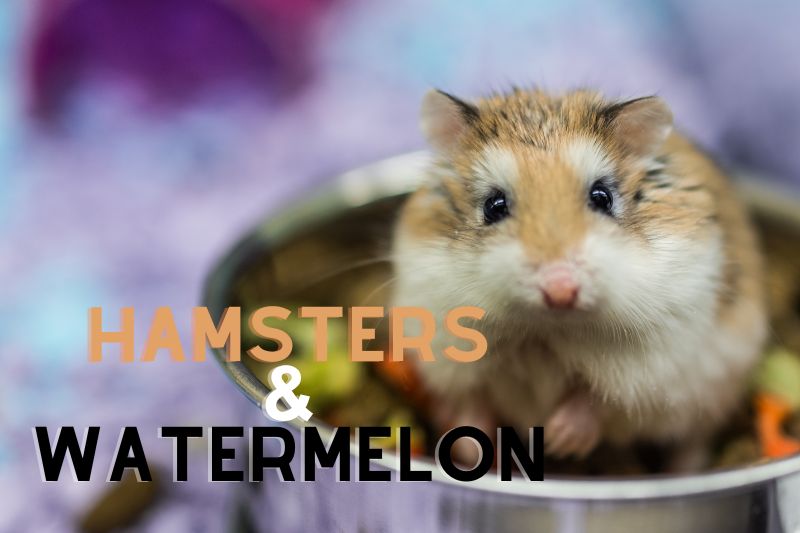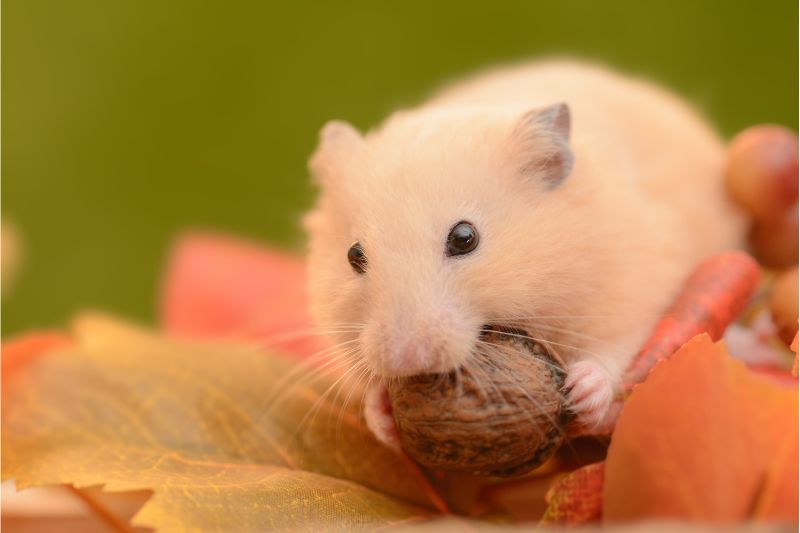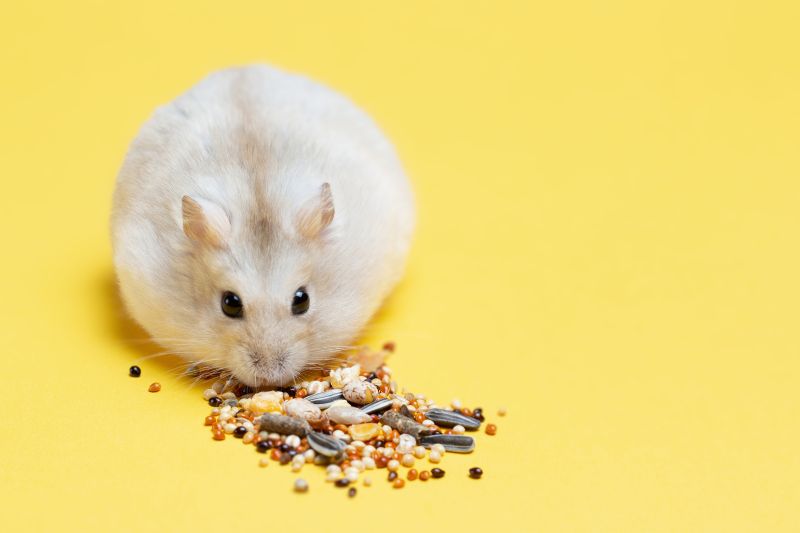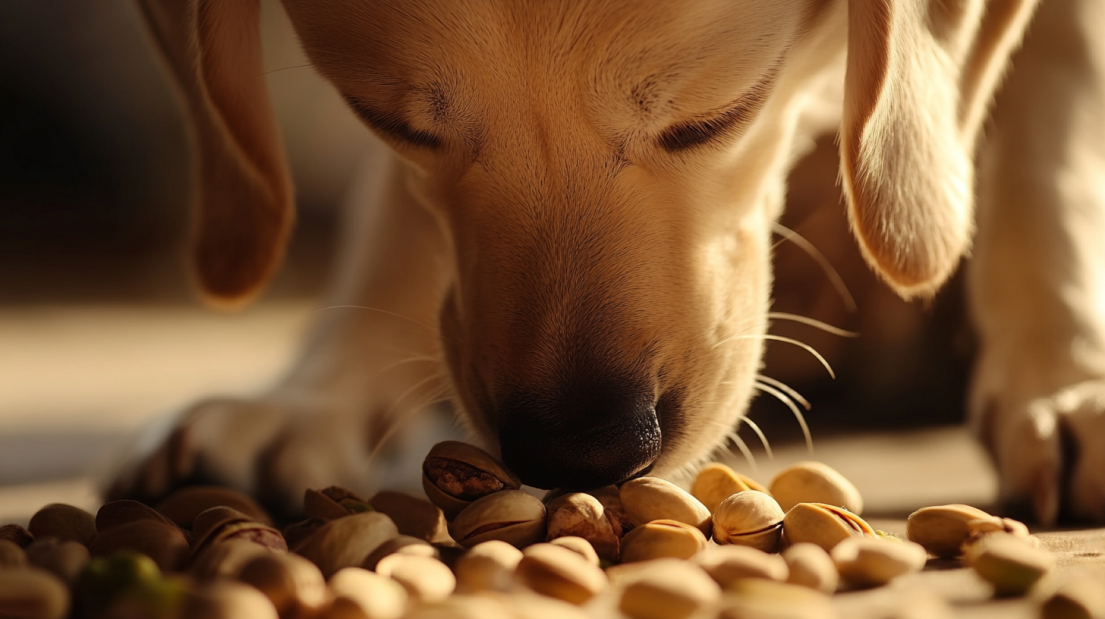
-
Milan
- Published:
- Updated: March 12, 2024
- Category: Pet Diet and Nutrition
Share Post:
Watermelon, with its juicy sweetness and refreshing taste, is a favorite fruit for many of us. But when it comes to our furry friends, specifically hamsters, is it a treat they can enjoy safely?
The answer is yes, it is safe for hamsters to eat this fruit but there are several things you should be careful about when giving it to your pet.
Today we’ll explore this topic further, providing valuable insights for hamster owners and enthusiasts alike.
Hamster Dietary Needs
These animals are omnivores, which means they eat both plant-based and animal-based foods. In the wild, they primarily consume seeds, grains, nuts, fruits, vegetables, and occasionally insects. These foods provide the essential nutrients they need for growth, energy, and overall health.
The Role of Fruits
While fruits are not a staple in a hamster’s natural diet, they can be a beneficial addition when offered in moderation. Fruits provide vitamins, minerals, and antioxidants that can boost their immune system and overall health.
However, it’s essential to choose fruits that are safe for hamsters and offer them in the right quantities.

The Pros and Cons of Feeding Watermelon to Hamsters
| Aspect | Benefits | Potential Risks and Concerns |
|---|---|---|
| Hydration | Provides hydration during hot days. | Too much can lead to diarrhea. |
| Nutritional Value | Rich in Vitamins A and C. | High sugar content can lead to obesity. |
| Taste and Dietary Variation | A flavorful treat and dietary change. | / |
| Digestive Health | / | High water content can upset digestion. |
| Physical Safety | / | Seeds can pose a choking hazard. |
Pros
- Watermelon, being composed of about 90% water, can be an excellent source of hydration for hamsters, especially during hot days. Just like humans, hamsters can benefit from a little extra hydration when the temperatures rise, and watermelon can serve as a tasty way to achieve this.
- However, this fruit is not just water and sugar; it’s also packed with vitamins and minerals. Vitamins A and C, in particular, are abundant in watermelon.
- Vitamin A is essential for maintaining healthy vision, skin, and neurological function, while Vitamin C is an antioxidant that helps the body repair damaged tissues and boosts the immune system.
- These nutrients can be especially beneficial for hamsters as they age or if they are recovering from an illness.
Use It As a Flavorful Treat!
Hamsters are curious creatures and often enjoy a change in their diet. The natural sweetness of watermelon can be a delightful treat for them, breaking the monotony of their regular seed-based diet. It can also be used as a reward or a bonding tool between the owner and the pet.
Cons
- While the high water content in watermelon can be a source of hydration, it can also be a double-edged sword. If a hamster consumes too much watermelon, it might ingest more water than its tiny body can handle, leading to diarrhea.
- Diarrhea, in turn, can lead to rapid dehydration in hamsters, which can be life-threatening if not addressed promptly.
- On the other hand, watermelon seeds, both the black and white varieties, can pose a choking risk to hamsters. Their small size means that even a tiny seed can become lodged in their throat.
- Moreover, if ingested, the seeds can be hard for hamsters to digest, potentially leading to gastrointestinal blockages.
- While hamsters might love the sweetness of watermelon, it’s essential to remember that it contains natural sugars. Excessive sugar intake can lead to obesity and diabetes, just as it can in humans. Therefore, it’s crucial to offer watermelon as an occasional treat and not a regular part of their diet.
Safe Ways to Introduce the Fruit to a Hamster’s Diet

Introducing any new food to your pet’s diet should be done with caution. Their tiny bodies can be sensitive to changes, and it’s essential to ensure they don’t have adverse reactions.
-
Start with Small Portions
When introducing watermelon, start with a tiny piece, no larger than the size of a dime. This allows you to monitor your hamster and ensure there are no adverse reactions, such as diarrhea or digestive discomfort.
-
Seedless and Rind-Free
Always ensure that the fruit piece is seedless to avoid any choking hazards. Additionally, it’s best to avoid giving hamsters the rind, as it can be harder for them to digest and may contain pesticides if not thoroughly washed.
Signs of Overconsumption
While watermelon is generally safe for hamsters in moderation, overconsumption can lead to health issues. It’s crucial to recognize the signs to ensure the well-being of your pet.
1. Diarrhea and Wet Tail
One of the most common symptoms of overconsumption is diarrhea, which can lead to a condition known as “wet tail.” Wet tail is a severe and often fatal disease in hamsters, so if you notice your hamster’s rear area is wet or soiled, it’s essential to consult a vet immediately.
2. Lethargy and Lack of Appetite
If a hamster consumes too much watermelon or any other fruit, they might become lethargic and show a decreased interest in their regular food. This can be a sign of an upset stomach or a more severe health issue.
Alternative Fruits
While watermelon can be a delightful treat, it’s not the only fruit that hamsters can enjoy safely. Offering a variety of fruits can ensure they receive a range of nutrients.
Blueberries: These are packed with antioxidants and can be a healthy treat for hamsters. They’re small and soft, making them easy for hamsters to eat. However, like all fruits, they should be given in moderation.
Strawberries: Strawberries can also be a hit with hamsters. They provide essential vitamins and minerals. However, ensure they are sliced into manageable pieces and always remove the green tops.
FAQs:

Can hamsters eat other types of melons besides watermelon?
Yes, hamsters can also eat other melons like cantaloupe and honeydew in moderation. However, as with watermelon, it’s essential to remove any seeds and offer them in small quantities to avoid digestive issues.
How often can I give my hamster watermelon?
It’s best to offer watermelon as an occasional treat, perhaps once a week or every other week. This ensures that your hamster doesn’t consume too much sugar or water content, which could lead to health issues.
Can baby hamsters eat watermelon?
Baby hamsters have delicate digestive systems. It’s best to wait until they are older and on a stable diet of hamster food before introducing treats like watermelon.
Is it okay to freeze watermelon?
While freezing watermelon can make for a refreshing treat, it might be too cold for your hamster and could lead to digestive discomfort. If you choose to give frozen watermelon, let it thaw slightly before offering it to your pet.
Are there any fruits that hamsters should absolutely avoid?
Yes, some fruits are not suitable for hamsters, such as citrus fruits (like lemons and oranges) because of their high acidity. Always research or consult with a vet before introducing a new fruit to your hamster’s diet.
Summary
While fruits like watermelon can be a refreshing treat for hamsters, it’s essential to be informed and cautious. By understanding the benefits, potential risks, and safe ways to introduce these treats, you can ensure your pet enjoys a varied diet without compromising their health.










